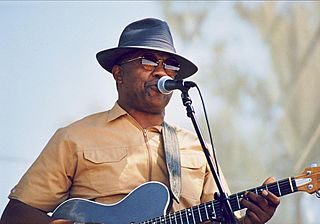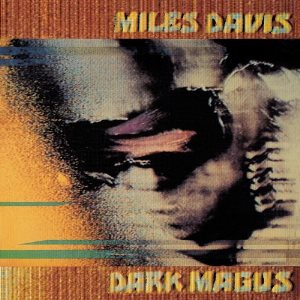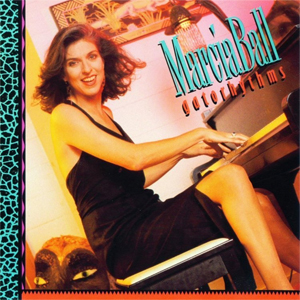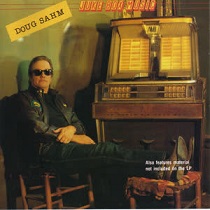
Marcia Ball is an American blues singer and pianist raised in Vinton, Louisiana.

John Weldon "J. J." Cale was an American guitarist, singer, and songwriter. Though he avoided the limelight, his influence as a musical artist has been acknowledged by figures such as Neil Young, Mark Knopfler, Waylon Jennings, and Eric Clapton, who described him as one of the most important artists in rock history. He is one of the originators of the Tulsa sound, a loose genre drawing on blues, rockabilly, country, and jazz.

Douglas Wayne Sahm was an American musician, singer-songwriter and multi-instrumentalist born in San Antonio, Texas. Sahm is regarded as one of the main figures of Tex-Mex music, and as an important performer of Texan Music. He gained fame along with his band, the Sir Douglas Quintet, with a top-twenty hit in the United States and the United Kingdom with "She's About a Mover" (1965). Sahm was influenced by the San Antonio music scene that included conjunto and blues, and later by the hippie scene of San Francisco. With his blend of music, he found success performing in Austin, Texas, as the hippie counterculture soared in the 1970s.

Naturally is the debut studio album by J. J. Cale released on October 25, 1971.

Double Trouble is an American blues rock band from Austin, Texas, which served as the backing band for singer-guitarist Stevie Ray Vaughan. The group was active throughout the 1980s and contributed to reviving blues music, inspiring many later blues and rock acts. Formed in Austin, Texas in 1978, the group went through several early line-up changes before settling on a power trio consisting of Vaughan, Chris Layton (drums), Tommy Shannon (bass). They became a four-piece by 1985 after adding Reese Wynans (keyboards). Whilst with Vaughan they were billed Stevie Ray Vaughan and Double Trouble. Rooted in blues and rock music, the group worked in various genres ranging from ballads to soul, often incorporating jazz and other musical elements.

Life in Exile after Abdication is the second album by Moe Tucker, released in 1989.

Lou Ann Barton is an American blues singer based in Austin, Texas since the 1970s. AllMusic noted that "The grace, poise, and confidence she projects on-stage is part of a long tradition for women blues singers".

Wesley Curley Clark was an American blues musician. He is known as the "Godfather of Austin Blues" for his influence on the Austin, Texas blues scene since the late 1960s.

Stephen John Hunter is an American guitarist, primarily a session player. He has worked with Lou Reed and Alice Cooper, acquiring the moniker "The Deacon". Hunter first played with Mitch Ryder's Detroit, beginning a long association with record producer Bob Ezrin who has said Steve Hunter has contributed so much to rock music in general that he truly deserves the designation of "Guitar Hero". Steve Hunter has played some of the greatest riffs in rock history - the first solo in Aerosmith's "Train Kept A Rollin'", the acoustic intro on Peter Gabriel's "Solsbury Hill" and he wrote the intro interlude on Lou Reed's live version of "Sweet Jane" on Reed's first gold record.

Dark Magus is a live double album by the American jazz trumpeter, composer, and bandleader Miles Davis. It was recorded on March 30, 1974, at Carnegie Hall in New York City, during the electric period in Davis' career. His group at the time included bassist Michael Henderson, drummer Al Foster, percussionist Mtume, saxophonist Dave Liebman, and guitarists Pete Cosey and Reggie Lucas; Davis used the performance to audition saxophonist Azar Lawrence and guitarist Dominique Gaumont. Dark Magus was produced by Teo Macero and featured four two-part recordings, titled with the Swahili numerals for numbers one through four.

G-Men Bootleg Series Vol.1 was Rory Gallagher's last official release before his untimely death in 1995.

Gatorhythms is an album by the American musician Marcia Ball, released in 1989 through Rounder Records. It was coproduced by Ball, who wrote or cowrote seven of the songs. She supported the album with a North American tour.
"Shake a Hand" is a 1953 song written by the trumpeter and bandleader Joe Morris and originally recorded by Faye Adams, whose version stayed number one on the U.S. Billboard R&B chart for nine weeks.

Dennis Edward Freeman was an American Texas and electric blues guitarist. Although he is primarily known as a guitar player, Freeman also played piano and electronic organ, both in concert and on various recordings. He worked with Stevie Ray Vaughan, Jimmie Vaughan, Bob Dylan, Angela Strehli, Lou Ann Barton, James Cotton, Taj Mahal, Barry Goldberg and Percy Sledge amongst others.

Birks' Works is an album by trumpeter Dizzy Gillespie recorded in 1957 and released on the Verve label. The original album featured 10 tracks and was reissued as Birks Works: The Verve Big Band Sessions, a 2 CD compilation featuring unreleased tracks, alternate takes and tracks from Gillespie's previous 1956 albums Dizzy in Greece and World Statesman.

Juke Box Music is an album by singer Doug Sahm released by Antone's Record Label in January 1989. Sahm returned to Austin, Texas in 1988 after living and experiencing success with his music in Sweden and Canada. Upon his return, Sahm started to perform at the Austin night club Antone's. The owner of the club, Clifford Antone signed him to his independent record label.

All That May Do My Rhyme is an album by the American musician Roky Erickson, released in 1995. It was released at the same time as a book, Openers II: The Lyrics of Roky Erickson, that collected Erickson's poems and lyrics.

Strange Pleasure is the first solo album by the American musician Jimmie Vaughan, released in 1994. It is dedicated to Stevie Ray Vaughan and Albert Collins. Vaughan supported the album with a North American tour, including shows with C. C. Adcock.

Old Enough is an album by the American musician Lou Ann Barton, released in 1982. It was a commercial disappointment that resulted in personal and music business problems for Barton. The album was reissued in 1993 and in 2007.


















